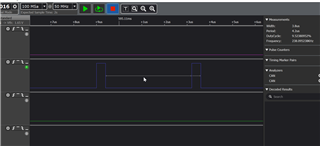Hi Expert,
My customer run the below code and find take up about 4us, which they think it is too long,
Could you take a check if it make sense to take so long time? thanks.
//*************************************************************************************************
//
// ESC_readBlockISR
//
//*************************************************************************************************
void ESC_readBlockISR(ESCMEM_ADDR *pData, uint16_t address, uint16_t len)
{
uint16_t i;
//
// Create pointer to ESC Address
//
//const void * escSource = (void *)(ESC_BASE + (uint32_t)(address >> 1U));
uint32_t Addr = ESC_BASE + (uint32_t)(address >> 1U);
//
// Copy ESC data to buffer. Convert lengths to words.
//
//memcpy(pData, escSource, (size_t)((len + 1U) >> 1U));
for( i = 0; i< (len >> 1);i++)
{
pData[ i ] = *(ESCMEM_ADDR*)( Addr + i );
}
//
// Determine if length (in bytes) is even or odd
// (No action on even)
//
if((len & 0x1U) == 0x1U)
{
//
// Odd Length
//
//
// Clear extra byte in buffer
//
pData[((len - 1U) >> 1U)] = (pData[((len - 1U) >> 1U)] & ESC_M_LSB);
}
}
They do a little modification of memory copy function as below and view the assembly code, still take about 4us. any thing wrong ?
ESC_readBlockISR():
0ab766: B2BD MOVL *SP++, XAR1
174 uint32_t Addr = ESC_BASE + (uint32_t)(address >> 1U);
0ab767: 8F450000 MOVL XAR5, #0x050000
0ab769: 8BA5 MOVL XAR1, @XAR5
0ab76a: FFC0 LSR AL, 1
0ab76b: 80A9 MOVZ AR7, @AL
167 {
0ab76c: 5DA8 MOVZ AR5, @AH
174 uint32_t Addr = ESC_BASE + (uint32_t)(address >> 1U);
0ab76d: B2A9 MOVL @ACC, XAR1
0ab76e: 0DA7 ADDU ACC, @AR7
0ab76f: 8BA9 MOVL XAR1, @ACC
181 for( i = 0; i< (len >> 1);i++)
0ab770: CCA5FFFE AND AL, @AR5, #0xfffe
0ab772: 610C SB $C$L9, EQ
0ab773: 92A5 MOV AL, @AR5
0ab774: D000 MOVB XAR0, #0x0
0ab775: C5A4 MOVL XAR7, @XAR4
0ab776: FFC0 LSR AL, 1
0ab777: 9CFF ADDB AL, #-1
0ab778: 88A9 MOVZ AR6, @AL
183 pData[ i ] = *(ESCMEM_ADDR*)( Addr + i );
$C$L8:
0ab779: 9291 MOV AL, *+XAR1[AR0]
181 for( i = 0; i< (len >> 1);i++)
0ab77a: D801 ADDB XAR0, #1
183 pData[ i ] = *(ESCMEM_ADDR*)( Addr + i );
0ab77b: 9687 MOV *XAR7++, AL
181 for( i = 0; i< (len >> 1);i++)
0ab77c: 000EFFFD BANZ -3,AR6--
190 if((len & 0x1U) == 0x1U)
$C$L9:
0ab77e: 40A5 TBIT @AR5, #0x0
0ab77f: 6C0A SB $C$L10, NTC
199 pData[((len - 1U) >> 1U)] = (pData[((len - 1U) >> 1U)] & ESC_M_LSB);
0ab780: DD81 SUBB XAR5, #1
0ab781: 92A5 MOV AL, @AR5
0ab782: FFC0 LSR AL, 1
0ab783: 5DA9 MOVZ AR5, @AL
0ab784: A8A9 MOVL @ACC, XAR4
0ab785: 0DA5 ADDU ACC, @AR5
0ab786: 8AA9 MOVL XAR4, @ACC
0ab787: 18C400FF AND *+XAR4[0], #0x00ff
$C$L10:
0ab789: 8BBE MOVL XAR1, *--SP
0ab78a: 0006 LRETR



